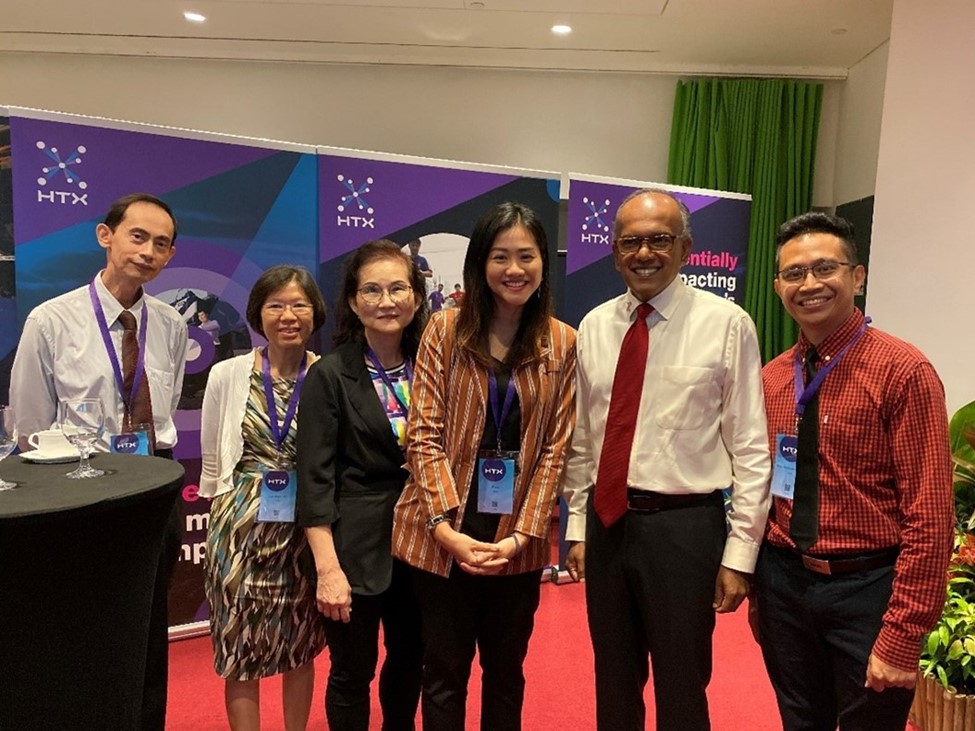.jpg?sfvrsn=648ef072_1)
Ahalid (left) with fellow colleague. Behind is the Interceptor,
one of the boats utilised by the Police Coast Guard. (Photo: HTX)
Some conversations, you never forget.
For Ahalid Hasmuni, this one took place way back in 2001. Seven months into his job with the Ministry of Home Affairs (MHA) as a technical support officer, he asked his supervisor: How do you rate my performance? Where do you think I can progress?
The answer: You could aim to be the head of the Engineering Quality Control (EQC) team.
Recalled Ahalid, of the conversation, “I thought he was joking. You need a degree to head the EQC. At the time, I was a diploma holder. I took it that my supervisor meant for me to emulate the man’s way of doing things, rather than his role.”
Well, Ahalid was promoted to that role 10 years later. That was his first leadership role, and his promotion came after he obtained his degree in engineering management in 2003.
In March this year, Ahalid, 51, who has worked on the design, maintenance and quality control of Police Coast Guard boats for the past 20 years, was promoted to become Deputy Director of Maintenance, Marine Systems, Platform Systems Sustainment Centre, under HTX.
He now oversees nine teams comprising 86 staff, who collectively take care of over 100 boats for the Police Coast Guard and the Singapore Civil Defence Force.
His is the inspiring story of the diploma-holder who scaled the public service career rungs to reach the Superscale level, driven by a steady slow-burning desire to improve himself and always seize opportunities to learn more.
Learning beyond the job
From the time he started working in 1995, he has always been on the lookout to deepen and broaden his skill sets, whether it be through further studies or on-the-job training.
At his first job at a Japanese company where his job as an assistant foreman was to maintain production line machines, he decided to take an advanced diploma in industrial engineering. He wanted to go beyond maintenance to learn more about how to improve processes.
I noticed that some managers who are not trained in engineering had difficulties communicating with engineers on the ground and vice versa. It’s like the chicken trying to talk to the duck. How do you close this gap? I wanted to learn how.
“I learnt about man-machine interfaces, motion studies, how to boost productivity,” said Ahalid, who then went on to work at an American computer CPU chip manufacturer as an associate engineer.
Later when Ahalid joined MHA, he studied part-time for 18 months for a degree in engineering management from the University of Western Sydney.
The interest in the subject was sparked when he realised that sometimes, there was a disconnect between engineers and management.
“I noticed that some managers who are not trained in engineering had difficulties communicating with engineers on the ground and vice versa. It’s like the chicken trying to talk to the duck. How do you close this gap? I wanted to learn how,” he said.
In his desire to learn, he has even gone beyond his job scope and volunteered to get involved in modifying and designing new boats.
“It was an eye-opening experience where I saw and learnt about the whole spectrum of public services processes, like evaluation, tendering, how to manage purchase orders, construction, design, trial to test the guns on the boats,” said Ahalid, who was awarded the Efficiency Medal in 2009.
In 20 years, he has been involved in the building of three different classes of boats projects, including a 35-metre boat project which is now the largest in the Police Coast Guard fleet and comes with a stabilised naval gun system. This new boat took four years to design and build.
“It drives me and gives me something else to think about and do, apart from my daily work. I derived energy from all the different things I was doing and learning about,” he said.
Supportive bosses
It is this desire to improve, and bosses who could see his potential, which has enabled him to develop a macro understanding of his work and be where he is today.
“I’m not ambitious. I just put my head down, focus on my work and do it well. I tell all my staff now who come in as technical support officers, that if they do their work well, the results will come and they will move on to the next level,” said Ahalid, adding that he imparts the same lesson to his 18-year-old daughter.

(From right to left) Ahalid with Home Affairs Minister K. Shanmugam and HTX staff at the HTX Launch event on 2 Dec 2019 (Photo: HTX)
Beyond internal motivation, the supportive culture of MHA and now HTX gave him plenty of opportunities to learn more. He found that the HTX culture – where people call each other by first name or initials regardless of grade or post – was even more conducive to expanding his work horizon.
He said, “When I was with commercial companies before MHA, I was just doing one thing. But when I joined MHA, there was always something new to try and it’s up to you to grab those opportunities to learn more.”
We are always seeking inquisitive and innovative individuals to co-create extraordinary solutions with us.
Join us to be at the forefront of the finest tech capabilities in the field! Join Us

